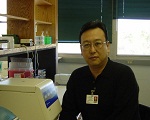Biography
Research Interest
Biography
1. What makes an article top quality?Â
Response: Originality.
2. Do you think that journals determine research trends?
Response: Yes.
3. What makes a good position paper?
Response: To be fair.
4. What are the qualities you look for in an article?
Response: What kind of new information the paper showed. Is it for or against previous finding? Basically, always needs to use positive and negative control.
5. Can you give us a broad indication of the types of themes a scientific journal should cover?
Response: I have no idea. It should be dependent on the journal.
6. What sorts of research methods and frameworks do you expect people to use, and how will they balance conceptual and applied research?
Response: Use the methods which is accepted. This is a big issue. A lot of people utilize certain methods without thinking whether or not the method is most appropriate for the experiments. I believe myself that Biology and Biochemistry are experimental science.
7. How would you describe the journal’s mission and editorial objectives to our readers?
Response: To provide information to the reader where we are and which direction we are going.
8. If you could be granted dream articles, what would they be on?
Response: Regulation of cellular function by intracellular oxygen.
9. Are there any particular areas which you would like to see, or expect to see, collaborate?
Response: Anyfields where stress induced chlonical changes are involved.
10. How does the research published percolate through to practitioners?
Response: I really want to know the answer.
11. How can a publisher ensure the authors/readers a rigorous peer review and quality control?
Response: It is a tough question. One of the important thing is to find an appropriate reviewer.
12. Your editorial policy is to be eclectic and welcome perspectives from other disciplines and schools. How does this translate into the types of contributions you encourage?
Response: I have no idea.
13. What do you see as the merits of journals, as opposed to book series, as a means of scholarly communications?
Response: It may be more open.
14. How do you differentiate Cell Biology: Research &Therapy with other journals in the field?
Response: I think that Journal will become the journal to combine basic research to clinical research.
